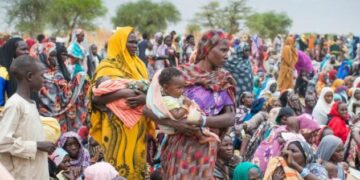By Ebi Kesiena
In conflict-torn Sudan, the World Health Organization (WHO) has warned that disease outbreaks, malnutrition and non-communicable diseases are on the rise, with devastating consequences for millions of people.
Since the conflict erupted in April 2015, more than 4.6 million people have become displaced inside Sudan. This number, adds to the more than three million who already were displaced within the country before the conflict, making Sudan home to the world’s largest internally displaced crisis.
According to the World Health Organization, the health system in Sudan is stretched to the breaking point and the country does not have the capacity to deal with the mounting health needs afflicting this enormous, vulnerable population.
WHO representative in Sudan, Ni’ma Saeed Abid, speaking from Port Sudan on Tuesday, said health care is limited due to insecurity, adding that 70 to 80 percent of health facilities are non-functional in conflict hotspots.
Abid told journalists that displacement and shortages of medicines and medical supplies are putting millions of Sudanese at risk of severe illness or death.
“conflict and the consequent massive displacement have driven the population further into a state of widespread malnutrition, with the lives of children hanging in the balance. Cholera, measles, dengue and malaria are circulating in several states. And a combination of any of these diseases with malnutrition can be lethal’’ he said.
WHO reports 3.4 million Sudanese children under five are acutely malnourished, and 700,000 are suffering from severe acute malnutrition, which can lead to death.
Furthermore, Abid stated that outbreaks of cholera have been declared in Gedaref, Khartoum and South Kordofan states, with suspected cases reported from Al Jazirah and Kassal states.
As of last week, WHO reports 1,962 suspected cholera cases with 30 lab-confirmed cases and 72 associated deaths. It estimates more than 3.1 million people are at risk of cholera until the end of December.
However, Abid said WHO has deployed 14 rapid response teams to the affected areas adding that WHO has stockpiled drugs and essential supplies for the treatment of cholera patients and is getting ready to receive oral cholera vaccines.




































